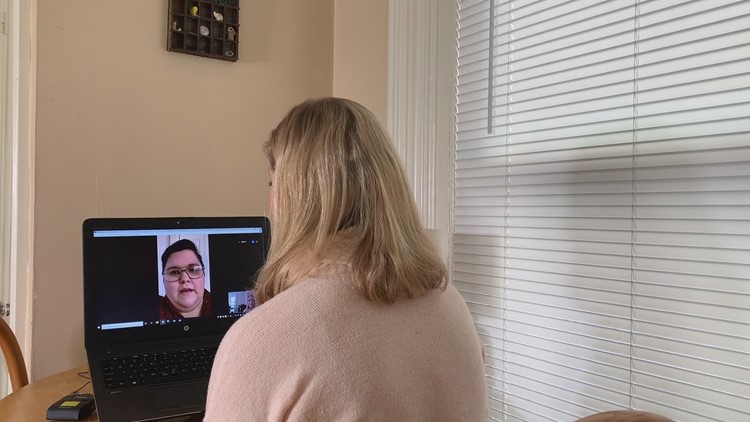MAINE, USA — In times of stress or hardship, feeling isolated and alone can really wear on a person's emotions. That logic is no different when it comes to the distancing measures people are taking to help prevent the spread of coronavirus in Maine -- and for many, it can be a difficult experience.
Kristie McDonald lives in Biddeford and has been staying put at home, since she has a weakened immune system. McDonald says she takes immuno-suppressing drugs for Crohn's disease and psoriasis, so while her health issues aren't as risky as some others in the wake of COVID-19, she says she isn't taking any chances.
"You know, when a friend even has a cold sometimes I’ll stay home because colds for me can turn into something more drastic," McDonald told NEWS CENTER Maine via video chat Wednesday afternoon.
The decision to remain in the safety of her apartment was two-fold -- to protect herself and to protect other people, like her elderly neighbors. It hasn't been an easy experience so far, but McDonald is thankful for her community's help.
"I’m lucky that I’ve had friends who will bring me things that I need and that sort of thing," McDonald expressed. "It just seemed better safe than sorry."
There have been challenges and stressors, though, McDonald says, during her time alone.
"Not seeing people is difficult, but the biggest thing is being worried about how I’m going to pay rent next month."
That's a concern that's on a lot of Americans' minds, as coronavirus continues to spread throughout the country. Now, every U.S. state has at least one case of COVID-19, and in Maine, the number of confirmed positive cases keeps rising every day.
"It impacts so many domains, so I think it’s kind of a social stress. It’s kind of a global stress," Jennifer Hubler, a clinical supervisor at Northern Light Acadia Hospital, explained. "Where normally there’s a stressor that exists in one or two of our life domains, this seems to be impacting them universally, uniformly -- so it’s kind of hard to get away from it."
To try to do so, Hubler recommends trying to exercise more, even if it's a light workout; connecting with family and friends via social media or video call; practicing mindful activities, like meditation; and seeing the purpose of this stress.
"Really, the purpose that we see here is that we are coming together as a community," Hubler emphasized. "Not physically, but we’re coming together as a community by staying apart -- so that is what we need to focus on."
RELATED: Coronavirus live updates: White House wants people to stay home, avoid groups larger than 10
For people who can't get out of their homes to get help, there are also online services available. Chuck McKay is a licensed clinical professional counselor based in Brewer, and he says he and his colleagues offer therapy sessions via a virtual waiting room (compliant with federal privacy laws) to patients who can't or would prefer not to come in.
"It’s very hard to go through those things, even without a crisis going on -- and if we have a crisis going on, we’re more distant from each other," McKay told NEWS CENTER Maine. "There are extra challenges in play there, so we do what we can day by day to make progress."
Despite anxiety and fear, that's how McDonald is looking at her situation, too -- and she wants others to do the same.
"Self isolation doesn’t mean emotionally isolating yourself. You might have to keep your body in one place, but your mind and your words can go other places," McDonald encouraged. "People really need to make sure that if they’re getting to a dark place when they’re alone, they need to reach out."
Click here for more mental health resources from Northern Light Acadia Hospital.



